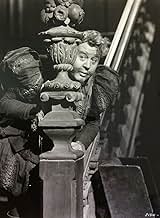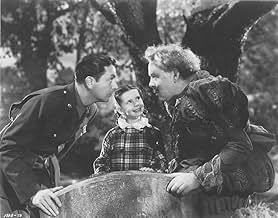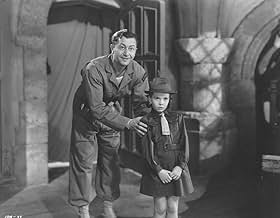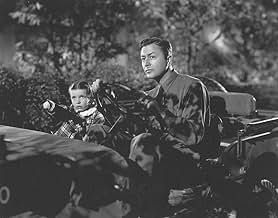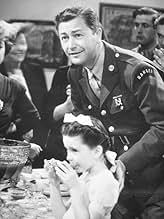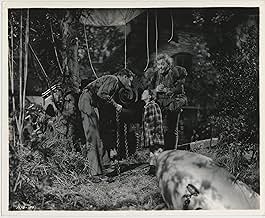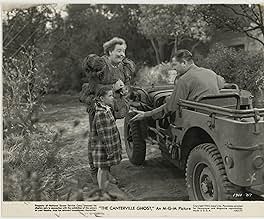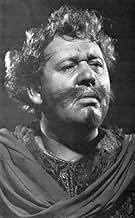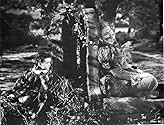IMDb RATING
6.9/10
3.4K
YOUR RATING
The descendent of a ghost imprisoned for cowardice hopes to free the spirit by displaying courage when under duress.The descendent of a ghost imprisoned for cowardice hopes to free the spirit by displaying courage when under duress.The descendent of a ghost imprisoned for cowardice hopes to free the spirit by displaying courage when under duress.
- Awards
- 1 win
Rags Ragland
- Big Harry
- (as 'Rags' Ragland)
Harry Allen
- Mr. Cawthorne at Party
- (uncredited)
- Directors
- Writers
- All cast & crew
- Production, box office & more at IMDbPro
Storyline
Did you know
- TriviaThe bomb that Cuffy and the ghost want to dispose of was known as a "blockbuster", so-called because it was so powerful it could demolish more than a dozen buildings i.e. a city block.
- GoofsWhile many German parachute mines with time delay dropped on England during World War II; but they weren't called blockbusters. The blockbuster was a type of bomb devised by the British. At first a blockbuster was a four thousand pound bomb; but later became an 8000 and then a 12000 pound bomb. They achieved these sizes by simply bolting two or three of the 4000 pounders together. They were called Blockbusters because it was calculated that they could destroy a city block.
- Quotes
Sir Simon de Canterville: Excuse me, I really must gibber at the oriole window.
- ConnectionsFeatured in Cineficción Radio: Lo fantástico (2020)
- SoundtracksBless 'em All
(uncredited)
Written by Fred Godfrey (1917)
Revised lyrics by Jimmy Hughes and Frank Lake (1940)
Additional lyrics by Al Stillman (1941)
Sung a cappella by the soldiers
Featured review
This, the first film version of Oscar Wilde's short story "The Canterville Ghost", was made by M-G-M during World War II, and, like some other films of that period based on literary or theatrical works, tries to incorporate some good old American (and British) flag-waving into its charming original story, which, as in all the TV versions (this is the only theatrical one) updates it to the twentieth century; when will someone do a good film version of the story in its original, nineteenth-century setting?
Fortunately, the story isn't tampered with enough to ruin it, and one of the film's virtues is Charles Laughton in the title role.
Proving what a great actor can bring to an average screenplay, Laughton hams it up outrageously in his comical first scene, in which his character, Sir Simon de Canterville, is still alive, but he later shows a deep sensitivity in the later scenes in which he expresses terror during his murder and quiet despair at his fate.
In order to incorporate some war heroics, a platoon of American soldiers has been incorporated into the story, and Laughton's descendant (Robert Young) must perform a heroic deed in order to break the curse that Laughton has been placed under. Some rather broad serviceman comedy has been incorporated into the story as well, courtesy of "Rags" Ragland and Frank Faylen (Dobie Gillis's dad on the TV series). It is Faylen who gets to deliver the film's most topical line--not having seen the ghost yet, he asks his fearful platoon, "What are you going to do when you have to face Nazis?" (What would Oscar Wilde have thought?)
Robert Young is his usual pleasant self as Laughton's descendant, and child star Margaret O'Brien isn't nearly as revoltingly syrupy as you might fear.
But it is Laughton's way with both sentiment and comedy that really makes the film worth watching, and it is worth watching.
Fortunately, the story isn't tampered with enough to ruin it, and one of the film's virtues is Charles Laughton in the title role.
Proving what a great actor can bring to an average screenplay, Laughton hams it up outrageously in his comical first scene, in which his character, Sir Simon de Canterville, is still alive, but he later shows a deep sensitivity in the later scenes in which he expresses terror during his murder and quiet despair at his fate.
In order to incorporate some war heroics, a platoon of American soldiers has been incorporated into the story, and Laughton's descendant (Robert Young) must perform a heroic deed in order to break the curse that Laughton has been placed under. Some rather broad serviceman comedy has been incorporated into the story as well, courtesy of "Rags" Ragland and Frank Faylen (Dobie Gillis's dad on the TV series). It is Faylen who gets to deliver the film's most topical line--not having seen the ghost yet, he asks his fearful platoon, "What are you going to do when you have to face Nazis?" (What would Oscar Wilde have thought?)
Robert Young is his usual pleasant self as Laughton's descendant, and child star Margaret O'Brien isn't nearly as revoltingly syrupy as you might fear.
But it is Laughton's way with both sentiment and comedy that really makes the film worth watching, and it is worth watching.
- How long is The Canterville Ghost?Powered by Alexa
Details
- Release date
- Country of origin
- Language
- Also known as
- El fantasma de Canterville
- Filming locations
- Production company
- See more company credits at IMDbPro
- Runtime1 hour 35 minutes
- Color
- Aspect ratio
- 1.37 : 1
Contribute to this page
Suggest an edit or add missing content




